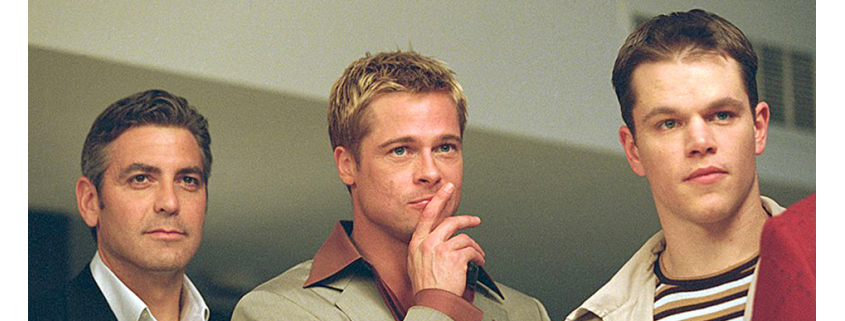Male- dominated films need rewrites
For years, I have told anybody who would listen that my dream would be to turn the Ocean’s trilogy series — all notoriously male-driven films- — into films comprised of solely women. This isn’t to say that I have problems with the original series. On the contrary, the Steven Soderbergh 2001 reboot is one of my favorite films. However, I always wondered if an audience would think that a similar Las Vegas heist story line, featuring women instead, would be just as suave and charming. I wondered if we could swallow such a change in the female narrative — one where female characters aren’t tied to the kitchen or clerical office jobs. The premise of these films would require a transformation of normal societal bounds — women liberated enough to not only steal, but to also get away with it too. I had little faith that such a remake could ever exist, but this past month, it was announced that Clooney’s production company would be financing another Ocean’s Eleven remake starring — you guessed it — an entirely female cast headed by Sandra Bullock. Upon examination, however, this news isn’t as celebratory as one would hope.
This announcement comes at the head of a string of films that feature female leads in previously male roles, the most recent being another Bullock film entitled Our Brand Is Crisis, which was originally to star Clooney. In the film, Bullock plays the same single bachelor Clooney would’ve played had he taken the part. The role was not rewritten drastically to make way for a husband or kids, but instead allowed Bullock to play the same crisis-managing, career-focused woman she should be allowed to play.
Next month, Julia Roberts stars as an FBI investigator in another female-heavy fast in Secret in their Eyes — a role originally meant to be for two male characters. In response to the gender-swapped role, Roberts stated confidently, “It takes two men to make one me.” Next year, there is also the Ghostbusters remake starring Kristin Wiig and Melissa McCarthy, in addition to The Gray Man starring Charlize Theron in a role originally intended for Benedict Cumberbatch and Tilda Swinton as Marvel’s Doctor Strange. All these casting decisions are positive steps in the right directions when it comes to equality for men and women in the industry.
This change of pace is especially welcome when considering this past weekend’s release of yet another James Bond film. Not only is Daniel Craig’s Bond the typical misogynistic womanizer the series has continued to reinforce for 52 years, but the character of M is now played by yet another white male — a role which was formerly occupied by the powerful Judi Dench until her character’s death in Skyfall. When watching the film, I wondered if there really was any place for a protagonist like Bond in 2015, whose principles and ways in which he deals with women seems outdated to the maximum. It had been three years since I had seen a Bond film of any kind, and I was dismayed to watch just how ridiculous his character really is. Bond tosses women aside left and right, and theoretically “falls in love” with Léa Seydoux’s character at the end — but this character arc stems from no place of reality. The four male screenwriters who wrote the film must’ve had a tough time coming up with motive for this old fashioned Bond because it comes off as forced and improbable when only days prior Bond abandons one woman in a hotel room and inexplicably seduces a grieving widow a few hours later. This is further substantiated when considering that the filmmakers could’ve cast anyone to be the new M — why precisely they went with Ralph Fiennes may never be known. It doesn’t seem like they wanted to work too out of the box. Bond has not been met without criticism, of course, and just this past year waves were made when online outlets and blogs proposed a new actor to play Bond: Idris Elba. Fans were both horrified and ecstatic at the prospect, but I for one believe that the problem doesn’t lie only in the casting, but the role itself.
Therefore, the idea of filling in roles with women where men were previously slotted does raise questions of whether we are truly transcending the confines of gender biases or rather just making quick fixes to fill quotas and push diversity. If the roles are still being written for men initially, then what are the actresses but simply runners-up in the casting game? And with even all those years of wishing and hoping for a female Ocean’s Eleven, I’ve now reached the point where I wonder if it should be done at all — because then the women will simply be compared to the male version once the new one is released, pitted against each other in a male versus female type competition. In turn, there should be an entirely new heist film set somewhere completely different, allowing women their own original treasure to steal and get away with it.
Maybe my idea from so long ago was rooted in wishful thinking and, perhaps, misinformed thinking. In Spectre, the old MI-6 building — which was blown up in the previous Bond installment — is slated for demolition because it’s “cheaper to knock it down than to rebuild.” Part of me wonders if, like MI-6 and like the James Bond character who had made it his home, it would be best to simply start anew than try to redo the old. This goes for Ocean’s Eleven, too.

